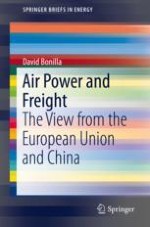2020 | OriginalPaper | Chapter
2. Road Freight Transport and Energy Use: The USA, China, the EU, Japan and Germany
Author : David Bonilla
Published in: Air Power and Freight
Publisher: Springer International Publishing
Activate our intelligent search to find suitable subject content or patents.
Select sections of text to find matching patents with Artificial Intelligence. powered by
Select sections of text to find additional relevant content using AI-assisted search. powered by
